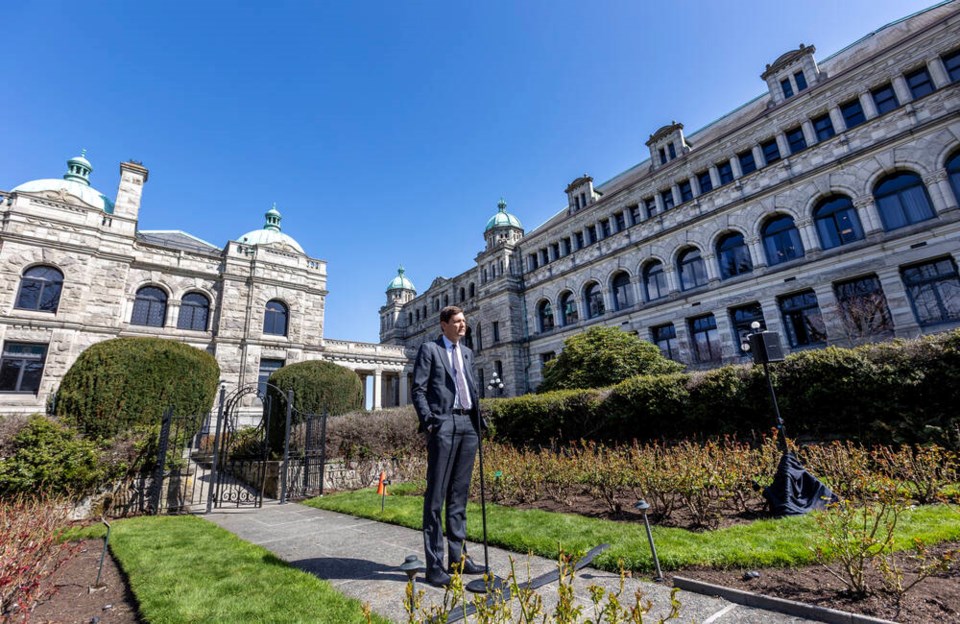The B.C. government will not back down on its controversial bill to fast-track infrastructure projects, despite being on a collision course with First Nations leaders.
Premier David Eby confirmed he still intends to pass Bill 15 this month, following an hour-long meeting with Indigenous organizations who complained of a lack of proper consultation.
“The bill is going ahead,” Eby told me in an interview Thursday.
“It's a critical bill for government, and it's a confidence bill. And the reason is pretty straightforward. We need to build the schools and hospitals and roads for a fast-growing province.”
That isn’t sitting well with B.C.’s three largest First Nations organizations, who were not consulted to co-develop the legislation as part of government’s usual practice since it passed UNDRIP into law in 2019.
They met with Eby Wednesday evening and on Thursday to call on the premier to withdraw the bill and start over to address concerns using respectful dialogue.
“If we sit down and go through the processes that we set up, I do believe we can fix this,” said Robert Phillips, political executive at the First Nations Summit.
“If he wants to ram it right through, then there’s going to be a problem.”
The legislation would allow cabinet to declare certain projects, ranging from mines to schools, as provincially significant. Doing so would unlock a host of new powers to fast-track environmental assessments, automatically issue permits and override municipal roadblocks.
Instead of one set of rules for all projects, the legislation would set up cabinet to “pick and choose winners” based on politics, favouritism and NDP insider connections, said Opposition BC Conservative Leader John Rustad.
“This is cash for access,” he said. “This is not the way that should be done.”
Former BC Green MLA Adam Olsen, who is now a negotiator at the Tsartlip Nation, said it’s an awful idea to replace a clear environmental assessment processes with an opaque, politically controlled system of favourites.
“I can see the lobbyists, and former BC NDP MLAs, lining up to make themselves available to proponents in order to get those projects of those proponents in front of the premier and seen in a favorable light,” he said.
“I think that that undermines the confidence that the public has in good due process.
“It makes the government vulnerable, because there's no parameters from which they're making that decision. It appears to just be political then.”
Eby said provincially significant projects “will be obvious to British Columbians” and include clean electricity, address climate change, critical minerals, schools and hospitals. They will all require full Indigenous support, he added.
“These are all huge and critical projects for our province, and it helps us grow our economy at the same time as we're facing threats from the U.S.,” said Eby.
I asked the premier whether, should Bill 15 become law, he’d feel comfortable with future premiers from other parties, perhaps including Rustad, having access to the same sweeping powers for cabinet to fast-track projects
“Incoming governments will write their own laws and will take their own actions,” he said, mostly sidestepping the question. “I can't govern the province that way. All I can do is listen to what people are saying to me, which is, we want you to grow the provincial economy, we want you to ensure we have good, high-quality services, and we want you to do it yesterday.”
The BC Greens declared Thursday they will vote against Bill 15, despite government considering it a matter of confidence. Eby said he was surprised to hear that, and called the legislation “important as a symbol of what matters to this government.”
“If the government falls because the Conservatives are voting against legislation that delivers major economic projects, schools and hospitals faster, then I really think that speaks for itself, and that's something we could campaign on,” he said.
“Obviously, that's not the plan here. The plan is to make sure that we pass the bill.”
Without the Greens, and assuming all other MLAs vote against Bill 15, the NDP would still be able to pass the legislation into law using Speaker Raj Chouhan as a tie-breaking vote.
Eby promised a similar show-down with critics over Bill 7, but later backtracked and gutted the bill to avoid criticism.
This time, it sounds like he intends to take the fight all the way.



